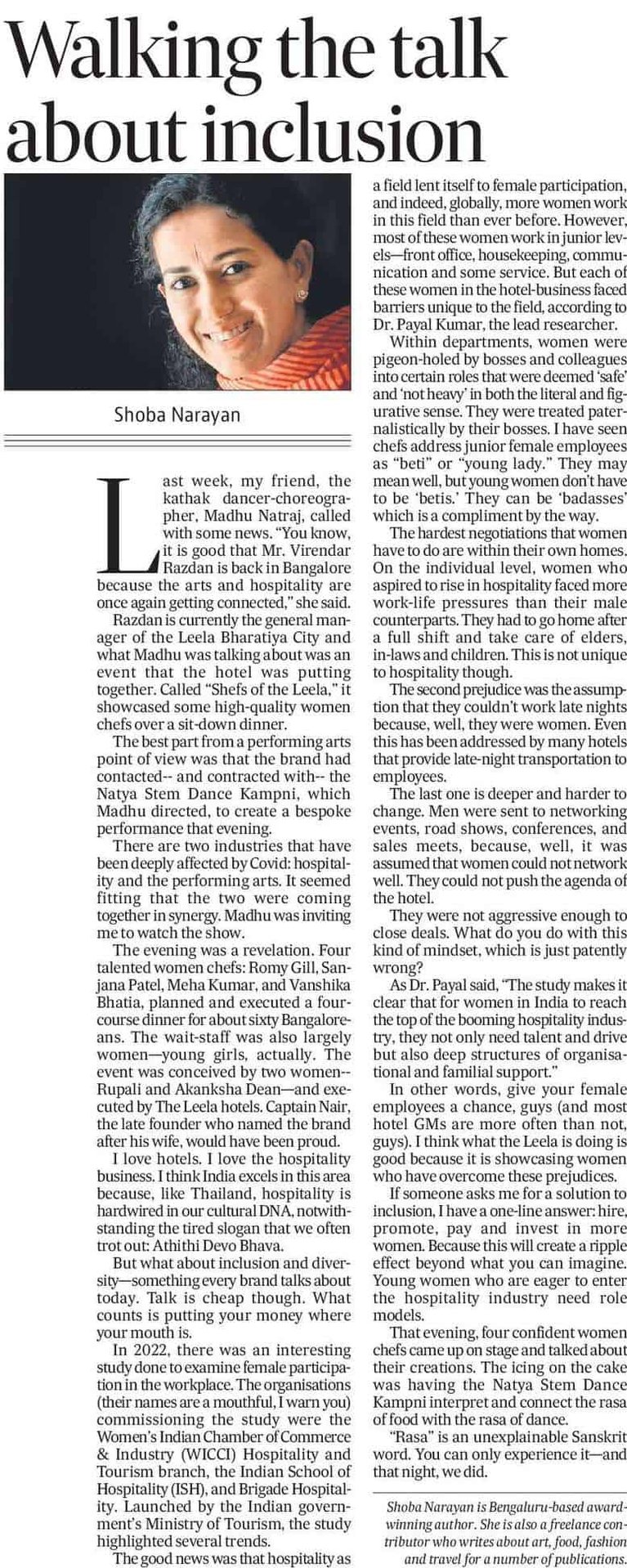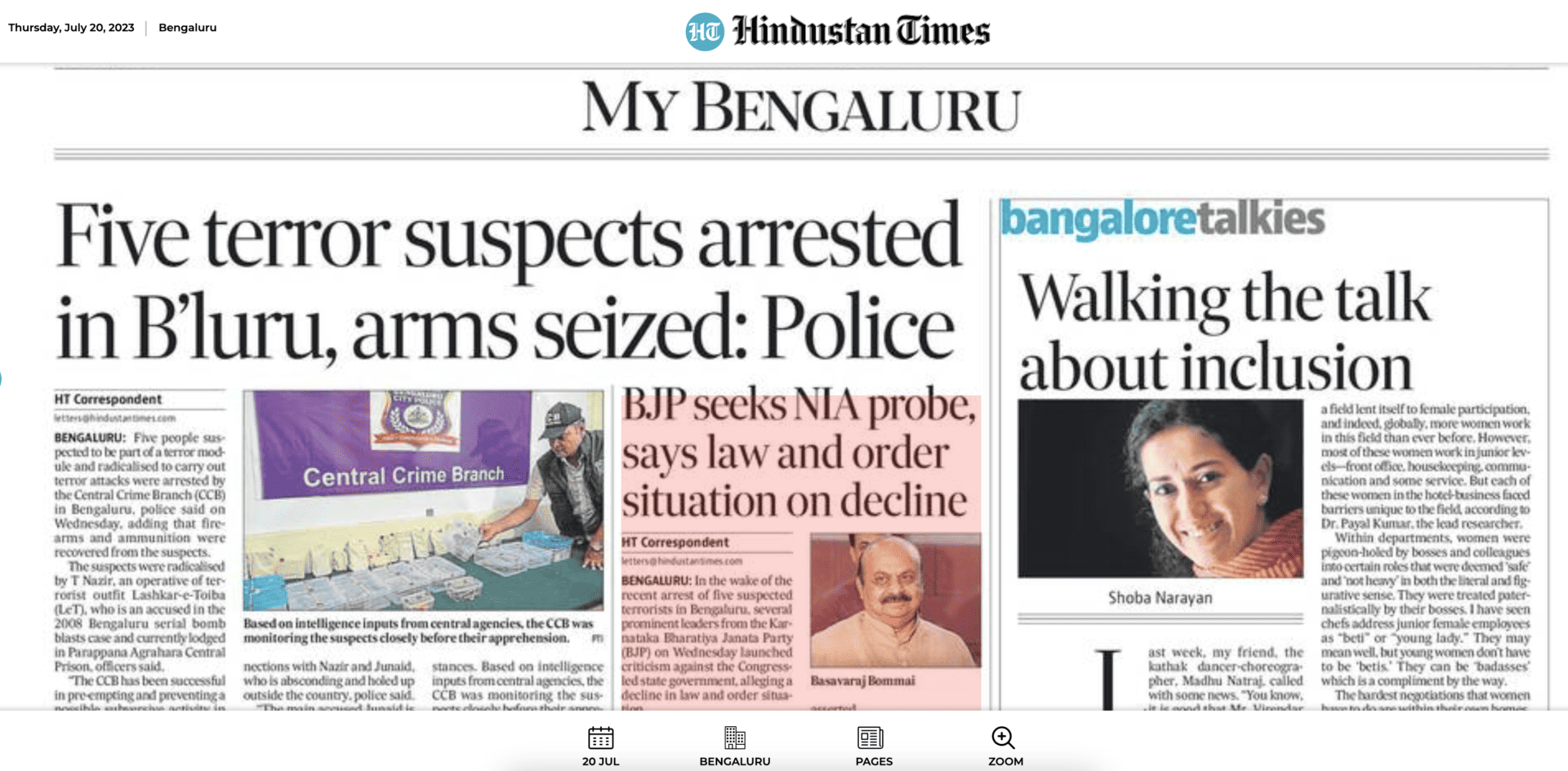Last week, my friend, the kathak dancer-choreographer, Madhu Natraj, called with some news. “You know, it is good that Mr. Virendar Razdan is back in Bangalore because the arts and hospitality are once again getting connected,” she said.
Razdan is currently the general manager of the Leela Bharatiya City and what Madhu was talking about was an event that the hotel was putting together. Called “Shefs of the Leela,” it showcased some high-quality women chefs over a sit-down dinner.
The best part from a performing arts point of view, was that the brand had contacted– and contracted with– the Natya Stem Dance Kampni, which Madhu directed, to create a bespoke performance that evening.
There are two industries that have been deeply affected by Covid: hospitality and the performing arts. It seemed fitting that the two were coming together in synergy. Madhu was inviting me to watch the show.

The evening was a revelation. Four talented women chefs: Romy Gill, Sanjana Patel, Meha Kumar, and Vanshika Bhatia, planned and executed a four-course dinner for about sixty Bangaloreans. The wait-staff was also largely women—young girls, actually. The event was conceived by two women– Rupali and Akanksha Dean—and executed by The Leela hotels. Captain Nair, the late founder who named the brand after his wife, would have been proud.
I love hotels. I love the hospitality business. I think India excels in this area because, like Thailand, hospitality is hardwired in our cultural DNA, notwithstanding the tired slogan that we often trot out: Athithi Devo Bhava.
But what about inclusion and diversity—something every brand today talks about. Talk is cheap though. What counts is putting your money where your mouth is.
In 2022, there was an interesting study done to examine female participation in the workplace. The organisations (their names are a mouthful, I warn you) commissioning the study were the Women’s Indian Chamber of Commerce & Industry (WICCI) Hospitality and Tourism branch, the Indian School of Hospitality (ISH), and Brigade Hospitality. Launched by the Indian government’s Ministry of Tourism, the study highlighted several trends.
The good news was that hospitality as a field lent itself to female participation, and indeed, globally, more women work in this field than ever before. However, most of these women work in junior levels—front office, housekeeping, communication and some service. But each of these women in the hotel-business faced barriers unique to the field, according to Dr. Payal Kumar, the lead researcher.
Within departments, women were pigeon-holed by bosses and colleagues into certain roles that were deemed ‘safe’ and ‘not heavy’ in both the literal and figurative sense. They were treated paternalistically by their bosses. I have seen chefs address junior female employees as “beti” or “young lady.” They may mean well, but young women don’t have to be ‘betis.’ They can be ‘badasses’ which is a compliment by the way.
The hardest negotiations that women have to do are within their own homes. On the individual level, women who aspired to rise in hospitality faced more work-life pressures than their male counterparts. They had to go home after a full shift and take care of elders, in-laws and children. This is not unique to hospitality though.
The second prejudice was the assumption that they couldn’t work late nights because, well, they were women. Even this has been addressed by many hotels that provide late-night transportation to employees.
The last one is deeper and harder to change. Men were sent to networking events, road shows, conferences, and sales meets, because, well, it was assumed that women could not network well. They could not push the agenda of the hotel. They were not aggressive enough to close deals. What do you do with this kind of mindset, which is just patently wrong?
As Dr. Payal said, “The study makes it clear that for women in India to reach the top of the booming hospitality industry, they not only need talent and drive but also deep structures of organisational and familial support.”
In other words, give your female employees a chance, guys (and most hotel GMs are more often than not, guys). I think what the Leela is doing is good because it is showcasing women who have overcome these prejudices.
If someone asks me for a solution to inclusion, I have a one-line answer: hire, promote, pay and invest in more women. Because this will create a ripple effect beyond what you can imagine. Young women who are eager to enter the hospitality industry need role models.
That evening, four confident women chefs came up on stage and talked about their creations. The icing on the cake was having the Natya Stem Dance Kampni interpret and connect the rasa of food with the rasa of dance.





Leave A Comment